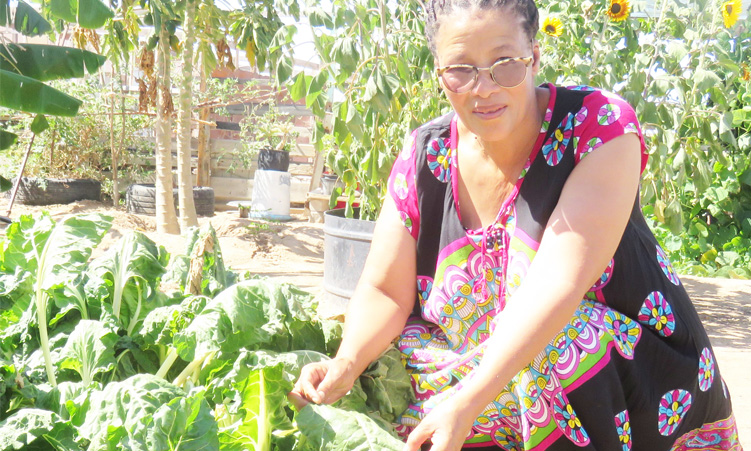Attempts by some residents at the Utusib and Swartbank settlements to grow vegetables in the Namib Desert are being hampered by excessive heat and a lack of water.
These two settlements are located along the Kuiseb River in the dry and hot Namib Desert.
This emerged when a group of 15 local journalists attending a five-day national media training on climate change and its effects on Namibia visited climate-smart agriculture projects in the area on Tuesday.
The training, held at Swakopmund from 12-16 February, is funded by the Climate Change and Sustainable Use of Natural Resources project, under the Ministry of Environment, Forestry and Tourism (MEFT) in collaboration with the Deutsche Welle Akademie (Namibia), Namibia Nature Foundation and Namibia Media Trust.
At Utusib, about 35 km south of Walvis Bay, Lena Kasper (59) has a small-scale garden which she started in 2016.
With the support from Rossing and GIZ-Farming for Resiliance ((F4R) project, which is a partner with Ministry of Agriculture, Water and Land Reform, she was able to expand her garden, growing tomatoes, spinach, onions, sweet potatoes and green beans, as well as moringa and lemon trees.
Kasper said the major challenges she faces in running her garden are the harsh hot environment and lack of water. She waters her garden with water from NamWater, which she pays for and due to the excessive heat, she is forced to water her garden at night as doing so in the afternoon is too hot and evaporation is too high.
She said the wind is too high in the area, negatively impacting her garden which contributes to the much-needed nutrition of her family, with some produce being sold to local residents.
At Swartbank (a stone’s throw south of Utusib), participants visited a community garden where members of the project have planted chilli, tomatoes and green pepper, among others.
However, with only one solar-powered borehole, the project is suffering from water scarcity, excessive heat and strong winds, originating from the very-close sand-dunes, said Anna Beukes (75), whose husband is a member of the project too.
Fanuel /Khurisab (33), Beukes’ grandchild, said the single borehole serves the whole Swartbank community which has led to water shortages in the community.
Both the Utusib and Swartbank settlements are inhibited by the Topnaar people, a clan of the Nama people of Namibia who began settling in the area of Walvis Bay and along the Kuiseb River in the 19th century.
The third field visit was to the JP Brand Primary School, where garden supervisor and teacher at the school, Tinda Hatutale, said the garden was started in 2021. This project also recieved support from the F4R project, which is a partner with the Ministry of Agriculture, Water and Land Reform, they were able to expand it to cater to the school’s 280 pupils.
Hatutale said vegetables produced by the garden greatly contribute to the school’s kitchen and has also been used to train pupils to grow vegetables, with some pupils even starting their own gardens at home.
School principal Josty Anna-Mildred said the dry and harsh environment is not a problem for their project but water is a challenge as the garden requires more water. School holidays also create a challenge for the garden because when students and teachers are away for holiday, there is no one to look after the garden.
She said climate change is real and negatively impacts agricultural activities.
The Swartbank agricultural community project and the school garden project have also received support from the GIZ- Farming for Resilience (F4R), in collaboration with the Ministry of Agriculture, Water and Land Reform.
While these three projects have received the assistance of good Samaritans, Elly Cloete (59), also a resident of Utusib, has a different story to tell.
She said she tried hard to expand her garden despite not receiving any help from donors.
While her garden produces good vegetables, she is struggling to find a market and does not have transport to travel to sell her produce.
“But I will continue to work hard,” said Cloete, who started her garden in 2006.
Stay informed with The Namibian – your source for credible journalism. Get in-depth reporting and opinions for
only N$85 a month. Invest in journalism, invest in democracy –
Subscribe Now!






